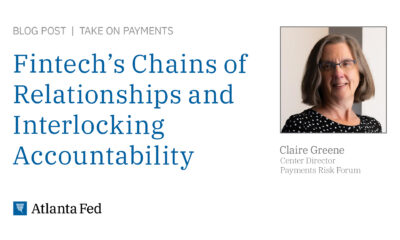Fintech
Is Your Money Really Safe In An ‘FDIC-Insured’ Fintech Account?

The answer–as evidenced by the collapse of Synapse–is not necessarily. Here’s what you need to know.
By Emily Mason, Forbes Staff
Four years ago, Lauren Scott was scrolling through TikTok when she saw a video from EcommJess, a personal finance influencer with 750,000 followers, promoting Yotta Savings, a fintech app offering a chance to win cash and other prizes on top of regular interest. Scott liked the novel sweepstakes incentive and Yotta’s lack of fees, along with something way more traditional. “It was FDIC-insured, which was one of the main things that I looked for because you never know what to trust,” says Scott, 27, who lives in the Tacoma, Washington suburbs with her husband and seven-year-old daughter. Eventually, the couple moved all their money to Yotta.
Now the Scotts are among 200,000 or so fintech customers—including 85,000 from Yotta—who have been denied access to their “FDIC insured” accounts since mid-May, following the Chapter 11 bankruptcy of a fintech intermediary: San Francisco’s Synapse Financial Technologies. It’s unclear when they’ll get access to their money, and even whether they’ll get it all back; at a court hearing Friday, former FDIC Chair Jelena McWilliams, appointed as bankruptcy trustee in the case, said there’s a “shortfall” between Synapse’s records and those of the banks currently estimated at $65 million to $96 million. Significantly, she added that it’s looking increasingly likely that this isn’t just a case of bad bookkeeping but a real shortfall–i.e. missing money–that existed before the bankruptcy filing and could take time and extensive investigation to sort out.
“Listen, I’m not a PhD in finance, right? I’m not. I’m just an average everyman,” says David Schulzinger, a 40-year-old Phoenix insurance adjuster, who has been frozen out of the $50,000 Yotta account he had built up over four years for vacations and unexpected expenses–such as his wife’s recent surgery. “It was always advertised as FDIC-insured. If I had for a moment thought that it wasn’t, I would never have put any money in this account.”
U.S. Bankruptcy Court Judge Martin R. Barash, of the Central District of California, who is presiding over the Synapse case, has seemed equally flabbergasted by the regulatory black hole fintech “depositors” and their money have been sucked into. “I’m confident the end users thought they were protected from this kind of thing,’’ said the exasperated jurist, who has made getting ordinary folks their money back his top priority. But he’s limited in what he has the power to do. “This is a serious situation and people are in crisis,’’ he said at a hearing earlier this month. “People are suffering.”
The delay is all the more jarring when compared to what happened after California regulators shut down Silicon Valley Bank on Friday March 10, 2023. By the following Monday, customers had access to their cash and federal bank regulators had stated that all deposits—including those in excess of the normal FDIC insurance limit of $250,000 per depositor—would be covered to mitigate the risk of SVB’s failure setting off more bank runs.
In the Synapse case, the FDIC says it can’t act because there hasn’t been a bank failure. As it noted in a “consumer news” bulletin issued after the Synapse disaster: “FDIC deposit insurance does not protect against the insolvency or bankruptcy of a nonbank company. In such cases, while consumers may be able to recover some or all of their funds through an insolvency or bankruptcy proceeding, often handled by a court, such recovery may take some time.” In other words, not our job.
The situation is such a mess—with no money left in Synapse’s coffers to hire experts—that a lawyer for McWilliams publicly asked for volunteer forensic accounting help. Barash wondered out loud if the federal Consumer Financial Protection Bureau might pitch in.
So do fintech customers have any of the FDIC protection they thought they did? Turns out what most of them have is “pass-through” FDIC insurance—meaning their money is held in a FBO (for the benefit of) account at the bank, usually mingled with cash from the fintech’s other customers.
In the case of a bank failure, the standard depositor insurance applies to FBO funds, provided, the FDIC states, there are clear records showing who owns what. But get this: the bank itself isn’t necessarily responsible for maintaining such records—those records could be maintained instead by a fintech or an intermediary like Synapse, which functioned as a bridge between fintech startups and the small banks holding customers’ funds, and apparently in some cases combined funds from multiple fintechs in each of its FBO accounts.
Bottom line: If a bank itself fails, and a fintech (or other third party) has good records, the fintech’s customers should be able to collect their insured deposits fairly quickly. If a nonbank fintech, particularly one with deficient records, implodes, all bets are off. Meanwhile, it’s difficult, if not impossible, for consumers to discern how responsibly individual fintechs have set-up accounts promising FDIC insurance.
“There’s a huge gap, frankly, in the financial structure in many ways,” says Paul Clark, a senior counsel and financial regulation expert at Seward & Kissel in Washington. “Most people hold their financial assets through a broker, a bank, a trust company, somebody who’s robustly regulated and regulated for that purpose. The fact is you can be a custodian for people’s assets in certain contexts and not have to register as anything.”
While Synapse has only been around for a decade, the concept of pass-through FDIC insurance is an old one. The FDIC first adopted regulations in 1946 allowing the custodian of an account—say a third-party fiduciary—to pass through insurance to the beneficiaries of that account, according to a law review article by Clark.
In 1980, after Congress decontrolled interest rates and increased the FDIC insurance cap from $40,000 to $100,000, brokers like Merrill Lynch began offering market-rate CDs to retail customers using FDIC pass-through insurance. These “brokered deposits”– commonly derided as “hot money”– added fuel to the 1980s savings and loan crisis, which ended up costing U.S. taxpayers about $300 billion in today’s dollars. (Ironically, brokered CDs might actually be a relatively stable source of funding in today’s banking system, when depositors can stage a run on a bank like SVB with a flick of the mouse or tap on a screen.)
Then, in 2000, Merrill Lynch (with Clark’s help) innovated again, by offering to sweep money in customers’ cash management accounts into FDIC-insured pass-through accounts, instead of keeping it in money market mutual funds. Today, Merrill Lynch is owned by Bank of America, and bank sweep accounts are a mainstay of broker—and fintech—offerings.
For example, Fidelity Investments’ Cash Management account boasts such checking account-like features as free ATM access, online bill payment and a debit card, plus $5 million in FDIC insurance—which Fidelity provides by sweeping customers’ money into FBO accounts at 24 partner banks. Even The Vanguard Group, a cautious mutual fund giant, recently rolled out a Cash Plus Account that provides FDIC insurance of $1.25 million per person (or $2.5 million per couple) by sweeping money into FBO accounts at five different FDIC-insured banks. (Vanguard’s account offers fewer features and is more like a bank money market than a checking account. But it pays a higher annual interest rate—currently 4.6% to Fidelity’s 2.72%).
Fidelity and Vanguard are both overseen by the Securities and Exchange Commission. Each has more than 50 million customers and manages trillions of assets—all of which presumably should give comfort to those relying on them for pass-through FDIC insurance.
Sankaet Pathak cofounded Synapse and was CEO until a bankruptcy trustee took over this month.
Tim Pannell for Forbes
As the Synapse case demonstrates, the combination of tiny fintech startups, subject to scant regulatory oversight, working with small and sometimes unsophisticated banks, poses a different level of risk. During a bankruptcy court hearing last month, a lawyer for one of Synapse’s smaller bank partners (Lineage bank in Franklin, Tennessee), defended the effort it was putting into sorting out the mess by pointing out that it had just 45 employees.
On the fintech side, some players were even tinier, yet were able to market a range of bank-like services, including debit and credit cards and deposit taking through middleman Synapse, which was backed by prominent venture capitalists, including Andreessen Horowitz. Synapse’s primary bank partner was Evolve Bank & Trust, a West Memphis, Arkansas-based state chartered bank that leaned heavily into the business of sponsoring fintechs. Between 2019 and 2023, Evolve’s deposits more than tripled from $436 million to $1.5 billion. According to data from FedFis.com, just 139 of the nation’s 4,568 FDIC-insured commercial and savings banks and 4,572 credit unions insured by the National Credit Union Administration, work with fintechs. These 139 have an average of six fintech partners each. By contrast, Evolve works with 85 partners, including such big names as Stripe, Dave and Affirm.
On Friday, Evolve consented to a tough and sweeping cease and desist order from the Federal Reserve and the Arkansas State Bank Department which bars it from expanding its fintech partnerships (either with new customers or new products) without permission from bank regulators. The order said that examination reports issued last August and again in January, found Evolve’s Open Banking Division (OBD)–the one that deals with fintechs–was violating rules related to risk management, offshore foreign assets, money laundering and consumer compliance. Under the consent order, Evolve must submit plans to regulators to revamp procedures at OBD and hire an independent third party to review the division.
In a statement, Evolve said it “remains well capitalized” and that the order “does not affect our existing business, customers, or deposits.” It characterized the enforcement action as “similar to orders” received by other banks that work with fintechs.
Synapse, too, became an assembly line, connecting fintechs and their customers with bank services and FDIC insurance. Still, in April of 2020, Forbes reported that the startup, under the leadership of CEO and cofounder Sankaet Pathak, had management problems so severe they threatened its future. In a bankruptcy court declaration, Pathak said that at the start of 2024 Synapse had 100 fintech clients serving approximately 10 million users. By the time it filed for Chapter 11 bankruptcy this past April, many of those clients had fled to other intermediaries or established direct relationships with banks. Still, in addition to Yotta, customers of Juno Finance, Copper Banking, GigWage, Grabr, Gravy, IDT, Latitud, Mercury, Sunny Day Fund, Abound and YieldStreet have been caught up in the mess.
“When we first launched Mercury, at that point we were on Synapse, we had nine employees,” recalls Immad Akhund, CEO and cofounder of business banking startup Mercury, a member of the Forbes Fintech 50 for 2024. “Realistically you probably need twice as big of a team to launch directly working with the partner bank. That does mean you need to raise more money and be ready for that, but at the same time, it maybe shouldn’t be that easy to do these things.”
Last October, Mercury told Synapse it would be moving to a direct banking relationship with Evolve. Synapse has claimed in bankruptcy filings that as part of that move, Evolve transferred more funds out of Synapse’s FBO accounts than it should have—a claim Evolve and Mercury deny. Regardless, by the time Synapse filed for Chapter 11, its relationship with Evolve was ending amid litigation and unreconciled books.
“It erodes confidence in the banking industry to have missing money that’s not reconciled,’’ laments Chris Nichols, director of capital markets at Winter Haven, Florida-based SouthState bank. “This has proven to be the regulators’ worst fears that the banks are going to be held responsible here.” SouthState has $45 billion in total assets and has taken a cautious approach to its fintech partnerships, sponsoring three prepaid debit cards and one secured credit card (a setup where money is deposited in advance to back up credit card charges).
“Fintechs have arbitraged the industry in that they’ve had all the benefits of the bank without the risks and the cost,” Nichols adds. “Banks have allowed this to happen in the quest for greater fees and deposit balances. The solution is a set of factors–less complexity, better compliance, more transparency, increased governance and better technology.”
Evolve isn’t the first bank to take heat for how it has managed (or more accurately, failed to manage) its relationship with fintechs. Regulators have been pressuring the banks, through enforcement actions, to take more responsibility over their fintech partnerships, especially when it comes to complying with know-your-customer and Bank Secrecy Act rules. Blue Ridge Bank, Cross River Bank, Metropolitan Commercial Bank, Vast Bank, B2 Bank, First Fed Bank, Choice Financial Group, Piermont Bank, Sutton Bank and notably, the same Lineage Bank involved in the Synapse case, have entered into consent orders relating to their oversight of fintech programs.
In March, a report by The Information detailed how FDIC officials were concerned, in particular, about Choice Financial Group’s partnership with Mercury and how the startup had opened accounts for customers abroad, including in Russia, Pakistan and Myanmar. (A spokesperson for Mercury told The Information: “Despite the demand for our product, we only onboard customers that align with our robust risk framework.” The company declined to comment further on the matter to Forbes.)
Some of the regulatory response–and particularly the regulators’ rhetoric–has gone beyond after-the-fact enforcement on a bank-by-bank basis.
In November 2022, the Treasury Department presented a report to President Biden’s White House Competition Council calling for additional oversight of bank-fintech partnerships and warning of new risks to consumer protection related to regulatory arbitrage and data security. The report also praised the role fintechs have played in encouraging competition in core consumer finance markets. In a statement at the report’s release, Treasury Secretary Janet Yellen suggested that “with existing authorities, regulators can encourage competition and innovation while further safeguarding and protecting consumers” — in other words, they can do more to protect consumers even without Congress passing new laws.
A year later, the Consumer Financial Protection Bureau proposed a rule that would bring nonbank tech companies offering digital wallets or payment apps under the agency’s authority to conduct examinations to ensure compliance with consumer financial laws. The proposal is designed to apply to companies handling more than five million transactions annually.
Meanwhile, the FDIC has taken several swipes at making sure consumers understand what they’re getting when FDIC insurance is touted by the fintechs. In December 2023, it announced new guidelines that require non-banks, including fintechs, to clearly disclose that they are not themselves FDIC-insured institutions and that deposit insurance only protects against the failure of an FDIC-insured bank. In the case of pass-through insurance, the fintechs must also clearly disclose that certain conditions must be met for that pass-through insurance to apply. The rules have a final compliance date of January 1, 2025, but some fintechs, including Mercury and Current, have already updated the disclosures on their websites.
This past February, in a speech at Vanderbilt University, Acting Comptroller of the Currency Michael J. Hsu suggested that there could be a broader risk when bank services are bundled and sold by nonbanks (i.e. fintechs) outside of the bank regulatory structure. “From a financial stability perspective, the deposit-taking-like activity warrants the most scrutiny because of the vulnerability it creates to runs,’’ he said. “Any entity managing money on behalf of customers can face a run if those customers have doubts about the safety of their money.”
There’s no doubt fintechs have pushed innovation—forcing banks to up their game and providing services to moderate and low income folks the banks may have ignored. For example, Chime, the nation’s largest fintech bank, with seven million customers, pioneered such consumer friendly innovations as giving customers access to direct-deposited paychecks two days earlier than the banks did. Chime offers FDIC pass-through insurance through master accounts with two banks—Stride Bank and The Bancorp Bank. It says that within those omnibus accounts it has set up individual demand deposit accounts for customers and that it reconciles its records with the banks’ records on a customer by customer basis, daily. “When any account is out of balance the bank and Chime work to resolve it. Even a $1 discrepancy would show up on daily reporting,’’ Chime said in a statement to Forbes.
Lead Bank CEO Jackie Reses
Nate Ryan for Forbes
Meanwhile, some entrepreneurs have spotted a business opportunity in helping the fintech industry clean up its act. In 2022, Jackie Reses, the former head of Square Capital, and her partners, acquired Lead Bank, a 96-year-old Kansas-City, Missouri-based bank. Now they have about 30 technical employees working on a system that reconciles bank records instantly with its fintech clients’ ledgers. Its system looks for anomalies in real time and provides instant alerts if there is an issue. One example could be alerting the bank to potential violations of Office of Foreign Assets Control regulations designed to enforce U.S. sanctions. Just as crucial: Reses, who is chairman and CEO of Lead, says she’ll only work with fintechs with a certain level of sophistication. (Lead bank is on the Forbes Fintech 50 list and Reses herself is on Forbes’ list of the richest self-made women.)
“Fintechs need to have the ledgering system, the money movement tools and the compliance for ongoing monitoring,” Reses says. “Every fintech needs to have an exacting system around scalability and reliability. Full stop.”
That’s the opposite of Synapse’s approach, which offered the smallest and least sophisticated fintechs a path to launch without going to the trouble or expense of building their own systems and expertise. But it’s still tough for an ordinary consumer, without special knowledge of the players in the fintech or banking industry, to tell the difference.
Even after the Synapse fiasco, the move fast and break things mentality survives in some quarters of the fintech world. On LinkedIn recently, Adam Shapiro, cofounder of financial services consulting firm Klaros Group, reported a fintech CEO complained to him (after the Synapse bankruptcy), that a bank wanted too much information. That won’t do anymore, Shapiro told Forbes. Fintechs have to understand that banks are now going to be asked by their regulators to prove they know what’s going on with their fintech partners. Plus, he says, the fintech industry itself is going to need some standards— “something that gives consumers reasonable belief that when they’re being told they’ve got insurance, those records are being maintained in a (responsible) way and that someone is reconciling those funds and checking they’re there.”
“That is the new world,’’ he declares.
MORE FROM FORBES
ForbesBroken Synapse: Why Employees And Customers Are Fleeing This Andreessen-Backed Fintech StartupBy Jeff KauflinForbesFederal Regulators Won’t Rescue Thousands Of ‘Depositors’ Caught In Synapse BankruptcyBy Emily MasonForbesExclusive: The Inside Story Of Chime, America’s Biggest Digital BankBy Jeff KauflinForbesSynapse Management Ousted As Fintech Customers Remain Frozen Out Of Their AccountsBy Emily Mason
Fintech
US Agencies Request Information on Bank-Fintech Dealings

Federal banking regulators have issued a statement reminding banks of the potential risks associated with third-party arrangements to provide bank deposit products and services.
The agencies support responsible innovation and banks that engage in these arrangements in a safe and fair manner and in compliance with applicable law. While these arrangements may offer benefits, supervisory experience has identified a number of safety and soundness, compliance, and consumer concerns with the management of these arrangements. The statement details potential risks and provides examples of effective risk management practices for these arrangements. Additionally, the statement reminds banks of existing legal requirements, guidance, and related resources and provides insights that the agencies have gained through their oversight. The statement does not establish new supervisory expectations.
Separately, the agencies requested additional information on a broad range of arrangements between banks and fintechs, including for deposit, payment, and lending products and services. The agencies are seeking input on the nature and implications of arrangements between banks and fintechs and effective risk management practices.
The agencies are considering whether to take additional steps to ensure that banks effectively manage the risks associated with these different types of arrangements.
SUBSCRIBE TO THE NEWSLETTER
And get exclusive articles on the stock markets
Fintech
What changes in financial regulation have impacted the development of financial technology?

Exploring the complex landscape of global financial regulation, we gather insights from leading fintech leaders, including CEOs and finance experts. From the game-changing impact of PSD2 to the significant role of GDPR in data security, explore the four key regulatory changes that have reshaped fintech development, answering the question: “What changes in financial regulation have impacted fintech development?”
- PSD2 revolutionizes access to financial technology
- GDPR Improves Fintech Data Privacy
- Regulatory Sandboxes Drive Fintech Innovation
- GDPR Impacts Fintech Data Security
PSD2 revolutionizes access to financial technology
When it comes to regulatory impact on fintech development, nothing comes close to PSD2. This EU regulation has created a new level playing field for market players of all sizes, from fintech startups to established banks. It has had a ripple effect on other markets around the world, inspiring similar regulatory frameworks and driving global innovation in fintech.
The Payment Services Directive (PSD2), the EU law in force since 2018, has revolutionized the fintech industry by requiring banks to provide third-party payment providers (TPPs) with access to payment services and customer account information via open APIs. This has democratized access to financial data, fostering the development of personalized financial instruments and seamless payment solutions. Advanced security measures such as Strong Customer Authentication (SCA) have increased consumer trust, pushing both fintech companies and traditional banks to innovate and collaborate more effectively, resulting in a dynamic and consumer-friendly financial ecosystem.
The impact of PSD2 has extended beyond the EU, inspiring similar regulations around the world. Countries such as the UK, Australia and Canada have launched their own open banking initiatives, spurred by the benefits seen in the EU. PSD2 has highlighted the benefits of open banking, also prompting US financial institutions and fintech companies to explore similar initiatives voluntarily.
This has led to a global wave of fintech innovation, with financial institutions and fintech companies offering more integrated, personalized and secure services. The EU’s leadership in open banking through PSD2 has set a global standard, promoting regulatory harmonization and fostering an interconnected and innovative global financial ecosystem.
Looking ahead, the EU’s PSD3 proposals and Financial Data Access (FIDA) regulations promise to further advance open banking. PSD3 aims to refine and build on PSD2, with a focus on improving transaction security, fraud prevention, and integration between banks and TPPs. FIDA will expand data sharing beyond payment accounts to include areas such as insurance and investments, paving the way for more comprehensive financial products and services.
These developments are set to further enhance connectivity, efficiency and innovation in financial services, cementing open banking as a key component of the global financial infrastructure.
General Manager, Technology and Product Consultant Fintech, Insurtech, Miquido
GDPR Improves Fintech Data Privacy
Privacy and data protection have been taken to another level by the General Data Protection Regulation (GDPR), forcing fintech companies to tighten their data management. In compliance with the GDPR, organizations must ensure that personal data is processed fairly, transparently, and securely.
This has led to increased innovation in fintech towards technologies such as encryption and anonymization for data protection. GDPR was described as a top priority in the data protection strategies of 92% of US-based companies surveyed by PwC.
Financial Expert, Sterlinx Global
Regulatory Sandboxes Drive Fintech Innovation
Since the UK’s Financial Conduct Authority (FCA) pioneered sandbox regulatory frameworks in 2016 to enable fintech startups to explore new products and services, similar frameworks have been introduced in other countries.
This has reduced the “crippling effect on innovation” caused by a “one size fits all” regulatory approach, which would also require machines to be built to complete regulatory compliance before any testing. Successful applications within sandboxes give regulators the confidence to move forward and address gaps in laws, regulations, or supervisory approaches. This has led to widespread adoption of new technologies and business models and helped channel private sector dynamism, while keeping consumers protected and imposing appropriate regulatory requirements.
Co-founder, UK Linkology
GDPR Impacts Fintech Data Security
A big change in financial regulations that has had a real impact on fintech is the 2018 EU General Data Protection Regulation (GDPR). I have seen how GDPR has pushed us to focus more on user privacy and data security.
GDPR means we have to handle personal data much more carefully. At Leverage, we have had to step up our game to meet these new rules. We have improved our data encryption and started doing regular security audits. It was a little tricky at first, but it has made our systems much more secure.
For example, we’ve added features that give users more control over their data, like simple consent tools and clear privacy notices. These changes have helped us comply with GDPR and made our customers feel more confident in how we handle their information.
I believe that GDPR has made fintech companies, including us at Leverage, more transparent and secure. It has helped build trust with our users, showing them that we take data protection seriously.
CEO & Co-Founder, Leverage Planning
Related Articles
Fintech
M2P Fintech About to Raise $80M

Application Programming Interface (API) Infrastructure Platform M2P Financial Technology has reached the final round to raise $80 million, at a valuation of $900 million.
Specifically, M2P Fintech, formerly known as Yap, is closing a new funding round involving new and existing investors, according to entrackr.com. The India-based company, which last raised funding two and a half years ago, previously secured $56 million in a round led by Insight Partners, earning a post-money valuation of $650 million.
A source indicated that M2P Fintech is ready to raise $80 million in this new funding round, led by a new investor. Existing backers, including Insight Partners, are also expected to participate. The new funding is expected to go toward enhancing the company’s technology infrastructure and driving growth in domestic and international markets.
What does M2P Fintech do?
M2P Fintech’s API platform enables businesses to provide branded financial services through partnerships with fintech companies while maintaining regulatory compliance. In addition to its operations in India, the company is active in Nepal, UAE, Australia, New Zealand, Philippines, Bahrain, Egypt, and many other countries.
Another source revealed that M2P Fintech’s valuation in this funding round is expected to be between USD 880 million and USD 900 million (post-money). The company has reportedly received a term sheet and the deal is expected to be publicly announced soon. The Tiger Global-backed company has acquired six companies to date, including Goals101, Syntizen, and BSG ITSOFT, to enhance its service offerings.
According to TheKredible, Beenext is the company’s largest shareholder with over 13% ownership, while the co-founders collectively own 34% of the company. Although M2P Fintech has yet to release its FY24 financials, it has reported a significant increase in operating revenue. However, this growth has also been accompanied by a substantial increase in losses.
Fintech
Scottish financial technology firm Aveni secures £11m to expand AI offering

By Gloria Methri
Today
- To come
- Aveni Assistance
- Aveni Detection
Artificial intelligence Financial Technology Aveni has announced one of the largest Series A investments in a Scottish company this year, amounting to £11 million. The investment is led by Puma Private Equity with participation from Par Equity, Lloyds Banking Group and Nationwide.
Aveni combines AI expertise with extensive financial services experience to create large language models (LLMs) and AI products designed specifically for the financial services industry. It is trusted by some of the UK’s leading financial services firms. It has seen significant business growth over the past two years through its conformity and productivity solutions, Aveni Detect and Aveni Assist.
This investment will enable Aveni to build on the success of its existing products, further consolidate its presence in the sector and introduce advanced technologies through FinLLM, a large-scale language model specifically for financial services.
FinLLM is being developed in partnership with new investors Lloyds Banking Group and Nationwide. It is a large, industry-aligned language model that aims to set the standard for transparent, responsible and ethical adoption of generative AI in UK financial services.
Following the investment, the team developing the FinLLM will be based at the Edinburgh Futures Institute, in a state-of-the-art facility.
Joseph Twigg, CEO of Aveniexplained, “The financial services industry doesn’t need AI models that can quote Shakespeare; it needs AI models that deliver transparency, trust, and most importantly, fairness. The way to achieve this is to develop small, highly tuned language models, trained on financial services data, and reviewed by financial services experts for specific financial services use cases. Generative AI is the most significant technological evolution of our generation, and we are in the early stages of adoption. This represents a significant opportunity for Aveni and our partners. The goal with FinLLM is to set a new standard for the controlled, responsible, and ethical adoption of generative AI, outperforming all other generic models in our select financial services use cases.”
Previous Article
Network International and Biz2X Sign Partnership for SME Financing
IBSi Daily News Analysis

SMBs Leverage Cloud to Gain Competitive Advantage, Study Shows
IBSi FinTech Magazine

- The Most Trusted FinTech Magazine Since 1991
- Digital monthly issue
- Over 60 pages of research, analysis, interviews, opinions and rankings
- Global coverage
subscribe now
-

 DeFi12 months ago
DeFi12 months agoDeFi Technologies Appoints Andrew Forson to Board of Directors
-

 Fintech12 months ago
Fintech12 months agoUS Agencies Request Information on Bank-Fintech Dealings
-

 News1 year ago
News1 year agoBlock Investors Need More to Assess Crypto Unit’s Earnings Potential, Analysts Say — TradingView News
-

 DeFi12 months ago
DeFi12 months agoSwitchboard Revolutionizes DeFi with New Oracle Aggregator
-

 DeFi12 months ago
DeFi12 months agoIs Zypto Wallet a Reliable Choice for DeFi Users?
-

 News1 year ago
News1 year agoBitcoin and Technology Correlation Collapses Due to Excess Supply
-

 Fintech12 months ago
Fintech12 months agoWhat changes in financial regulation have impacted the development of financial technology?
-

 Fintech12 months ago
Fintech12 months agoScottish financial technology firm Aveni secures £11m to expand AI offering
-

 Fintech12 months ago
Fintech12 months agoScottish financial technology firm Aveni raises £11m to develop custom AI model for financial services
-

 News1 year ago
News1 year agoValueZone launches new tools to maximize earnings during the ongoing crypto summer
-

 Videos6 months ago
Videos6 months ago“Artificial intelligence is bringing us to a future that we may not survive” – Sco to Whitney Webb’s Waorting!
-

 DeFi1 year ago
DeFi1 year agoTON Network Surpasses $200M TVL, Boosted by Open League and DeFi Growth ⋆ ZyCrypto
















